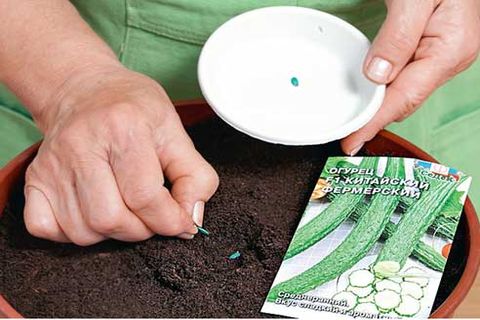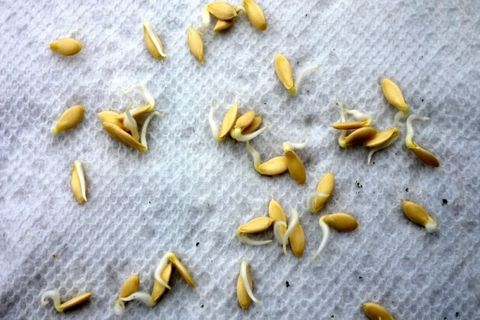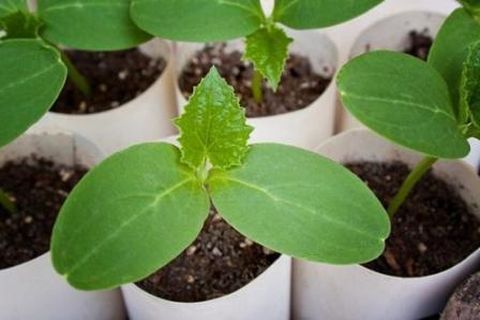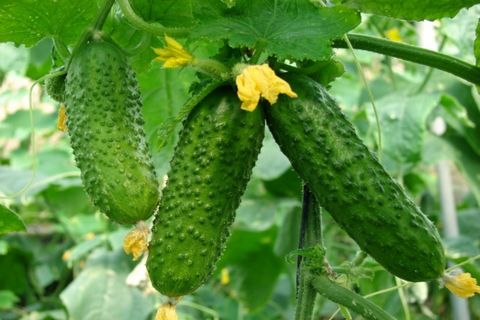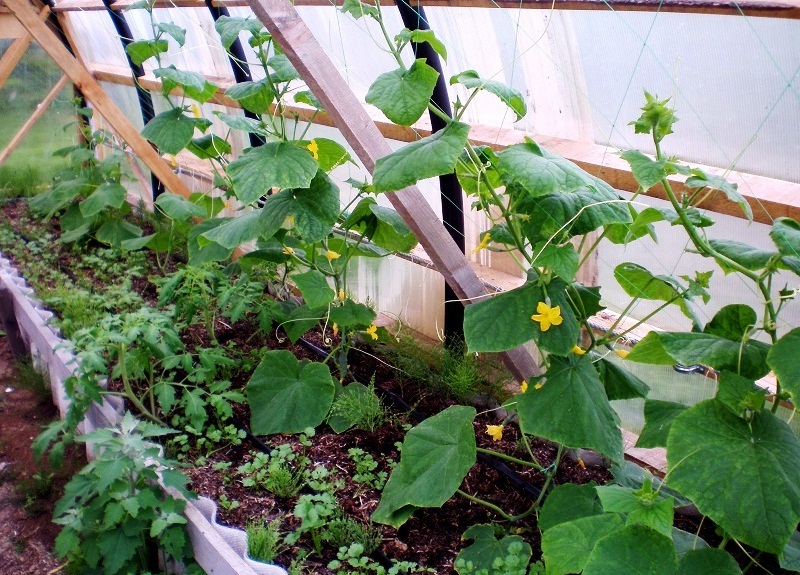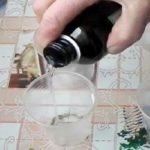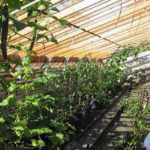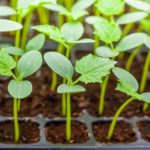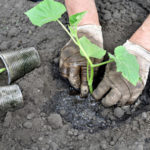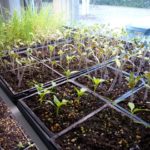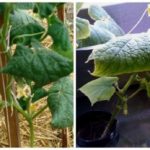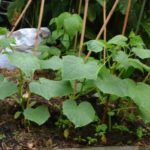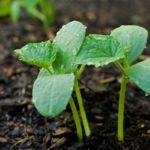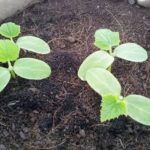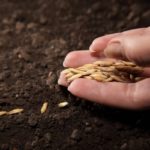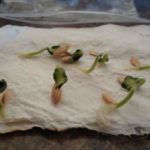Surely there is no person who does not like cucumbers. Nowadays, to obtain an environmentally friendly product, an increasing number of the population prefers growing plants on their own. But to get the best possible harvest, you need to have information on how to prepare cucumber seeds for planting.
How to properly collect material for sowing yourself
Remember that only certain varieties of cucumbers can collect seeds for sowing. To do this, the fruits must be on the bushes until fully ripe - they are also called seed fruits.The cucumber is picked only when its color turns yellow. Afterwards, it is recommended to place the fruit in a warm place for about a week - this time is enough for the cucumber to become soft. Then, after cutting the vegetable, the seeds are thrown into water (preferably a glass container) and left for several days.
Please note that the situation when a film or mold forms is normal. This is due to the fermentation process.
When the sowing material sinks to the bottom, the film is removed and the container is shaken, which will separate the empty seeds that float to the surface. The remaining ones are washed and dried. It is recommended to lay them out on gauze or a tray.
Do not use plain paper to dry, as this may stick to them. When pre-sowing cucumber seeds, do not speed up their drying by artificial heating.
If the cucumber seeds prepared for sowing have dried well, they are placed in a paper envelope and signed, noting the variety and time of collection. To ensure that the seeds are stored correctly, the bag is placed in a dry place.
The shelf life of seeds collected in this way is three years. Two-year and three-year-old specimens have a higher germination rate, but later their shelf life decreases. To improve the quality of young seeds, special conditions are created: they are stored in a dry place, protected from direct sunlight, at temperatures up to 20 °C.
To prepare cucumber seeds for sowing as seedlings, fruits of varieties marked F1 are not suitable - this is a designation for hybrids that are sterile.
Preparation process
To get a high level of yield, you need to know how to properly prepare the seeds.
The following actions are recommended for preparing seed material:
- determine germination;
- disinfect;
- stimulate germination;
- harden the seeds.
To grow seedlings, cucumber seeds are prepared for planting in a greenhouse.
How to determine germination
On the shelves of agricultural stores and kiosks you can find seed material of various varieties of cucumbers, however, even there the seeds may be of poor quality, unprocessed and unsuitable for growth. Now we’ll figure out how to properly prepare cucumber seeds from a bag.
To select healthy specimens, it is recommended to place them in a solution that can be prepared by dissolving 50 g of salt in a liter of water. Those that float can be considered unusable and thrown away.
It is recommended to sort processed cucumber seeds by size, because larger ones should be planted deeper in the soil. It is better to do this a month before the planned sowing.
It should be remembered that the shelf life of seeds should not exceed three years.
Warming up
When preparing cucumber seeds for sowing in open ground, you need to use heating. The best option is to place the material for sowing on a stove or near a battery in a suspended state. As for temperature, the readings should not exceed 35 ° C or fall below 23 ° C. This is explained by the fact that otherwise the seeds will be overdried or steamed.
You can warm them up using a thermostat. It is enough to place the seed in it for a period of time, the duration of which is 2 - 3.5 hours - everything will depend on the temperature.
Such measures will improve germination and yield, stimulate the formation of female color, which will make it possible to obtain ripe cucumbers as early as possible.
When preparing seeds for planting in open ground, they are fertilized by soaking them in a certain composition for several hours.The mixture may include ash, sodium humate or Nitroammofoska. A considerable number of studies indicate that the necessary properties are characteristic of melt water. Afterwards, the material for sowing is washed, placed on a damp cloth and left for 24 hours in a dark place.
Hardening
It is necessary to harden cucumber seeds before planting so that their subsequent exposure to a dark, cool place after planting as seedlings does not affect the quality.
Hardening is carried out by gradually reducing the temperature of the environment where the seed material is stored. You can ventilate the room or keep the seeds in the refrigerator for a day.
Disinfection
It is necessary to carry out disinfection. Please note that after dressing, not only will the risk of developing diseases decrease, but the level of resistance of the vegetable crop to the negative effects of environmental factors will also increase. To carry out the procedure, you need to treat the seed material with a strong solution of potassium permanganate or boric acid.
You can irradiate the seeds with ultraviolet light for 3 to 5 minutes. Afterwards, you need to ensure that light does not reach the material for sowing until it enters the soil. It is recommended to place the seeds in a bag made of light-proof material.
What to do with seeds from factory packaging? Seed purchased in a store marked F1 on the package does not need to be hardened or fed. All that is necessary is to determine the percentage of germination by germination before sowing in the ground.
Growing seedlings correctly
Before planting cucumbers in the ground, you need to grow seedlings. Putting into practice information on how cucumber seeds are prepared for planting as seedlings will help to obtain the most favorable results:
- bushes grow quickly;
- cucumbers will bear fruit for a long time, until the first frost;
- there will be a good harvest.
Before planting seeds, they need to be germinated. Place a cotton cloth soaked in water and aloe juice in a bowl or tray and place the seeds on it. Cover with gauze and irrigate with the same water.
The first roots will appear within 1.5 days from the moment of soaking. After this, the planting material is immediately placed in the soil, even before the first shoots. Each seed must be planted separately.
It is better if the soil is prepared. This can be done by combining peat, humus and sawdust. The mixture is scalded with boiling water. Sow the seeds to a depth not exceeding 1.5 - 2 cm, irrigate with warm water and cover.
For the first three days, containers with seedlings should be kept warm. Immediately after the first shoots appear, the film must be removed and the seedlings placed in a well-lit place. Particular attention should be paid to temperature - during the day the indicator should not be higher than 20 degrees, and at night - 15.
For better growth and development of seedlings, it is necessary to provide lighting for 10 - 11 hours a day. You can use a fluorescent lamp.
As for watering, it should be done after the first leaves appear. You need to be very careful to ensure that water does not fall on the stems, but only wets the soil. Reviews say that it is more convenient to water with a teaspoon.
A strong stem with green leaves and a powerful root will indicate the readiness of greenhouse seedlings for planting in open ground.
The soil should be heated to 15 degrees, and the air temperature should be below 18 degrees. Before planting seedlings, you can take the bushes outside for several days so that the plants adapt to the environment.
It is necessary to focus attention on the fact that preparing cucumber seeds for sowing is not such a simple matter. This is a labor-intensive task that requires a lot of time, effort and patience. If you follow all the recommendations about collecting, staying in a greenhouse and planting seedlings in the soil, the result will be impressive. A high level of productivity for a long time will please the gardener and will be a kind of gratitude from the cucumbers.
A lot of positive emotions appear when you get excellent results from your work and understand that your efforts were not wasted. In addition, you can enjoy cucumbers not only during their fruiting period, but also in winter. Of course, if you take care of it in advance.

